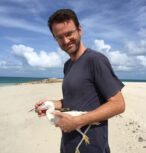DNA reveals the past and future of coral reefs
New DNA techniques are being used to understand how coral reacted to the end of the last ice age in order to better predict how they will cope with current changes to the climate. James Cook Univer

From 2005 to 2022, the main node of the ARC Centre of Excellence for Coral Reef Studies was headquartered at James Cook University in Townsville, Queensland (Australia)








Abstract:
Connectivity plays a vital role in many ecosystems through its effects on fundamental ecological and evolutionary processes. Its consequences for populations and metapopulations have been well-documented, but the influence of connectivity on animal communities is less well understood. Landscape ecology has recently seen the revival of a long-standing debate about the importance of habitat amount (composition) vs arrangement (configuration) for community composition. One of the central challenges in resolving this debate is that of selecting and measuring a scale of analysis, given that different species may move over a wide range of different scales.
After introducing some core ideas about connectivity and network analysis, I will propose a new measure of patch connectivity, cross-scale centrality, which identifies the patches that most consistently contribute to landscape connectivity across multiple different scales. Results from a metapopulation simulation model support my claims of ecological relevance. I then turn to a real-world case study of the fish communities using coral reefs in the Great Barrier Reef Marine Park. Cross-scale connectivity and other regional influences can explain a significant amount of the variance in fish community composition across the AIMS long-term sampling sites. The analysis also supports the hypothesis that the GBRMPA management zones make a difference to fish communities. The findings suggest a potentially important role for management of the GBR to facilitate connectivity between reefs, and highlight the need to carefully prioritise the spatial location of ongoing restoration efforts if they are to be successful.
Bio:
Graeme grew up in Harare, Zimbabwe, and studied in South Africa and England. Following a postdoc in Madison, Wisconsin, he held a position at the University of Florida before returning to South Africa in 2006 to take up the position of Pola Pasvolsky Chair in Conservation Biology at the University of Cape Town. He started at the CoE in 2015 and has been the Director since mid-2020. Graeme is a landscape ecologist and conservation theorist with a wide range of research interests that revolve around understanding spatial pattern-process-structure dynamics in natural resource management.
New DNA techniques are being used to understand how coral reacted to the end of the last ice age in order to better predict how they will cope with current changes to the climate. James Cook Univer
A new study on the effects of climate change in five tropical countries has found fisheries are in more trouble than agriculture, and poor people are in the most danger. Distinguished Profess
James Cook University researchers have found brightly coloured fish are becoming increasingly rare as coral declines, with the phenomenon likely to get worse in the future. Christopher Hemingson, a
Researchers working with stakeholders in the Great Barrier Reef region have come up with ideas on how groups responsible for looking after the reef can operate more effectively when the next bleaching
Abstract: As marine species adapt to climate change, their heat tolerance will likely be under strong selection. Individual variation in heat tolerance and its heritability underpin the potential fo
Abstract: The Reef Ecology Lab in KAUST’s Red Sea Research Center explores many aspects of movement ecology of marine organisms, ranging from adult migrations to intergenerational larval dispersal
Abstract: Macroalgal meadows are a prominent, yet often maligned component of the tropical seascape. Our work at Ningaloo reef in WA demonstrate that canopy forming macroalgae provide habitat for ad
Abstract: Sharks are generally perceived as strong and fearsome animals. With fossils dating back at least 420 million years, sharks are not only majestic top predators but they also outlived dinosa
Abstract: Connectivity plays a vital role in many ecosystems through its effects on fundamental ecological and evolutionary processes. Its consequences for populations and metapopulations have been
Abstract: Evolution of many eukaryotic organisms is affected by interactions with microbes. Microbial symbioses can ultimately reflect host’s diet, habitat range, and even body shape. However, how
Abstract: The past few years have seen unprecedented coral bleaching and mortality on the Great Barrier Reef (GBR) but the consequences of this on biodiversity are not yet known. This talk will expl